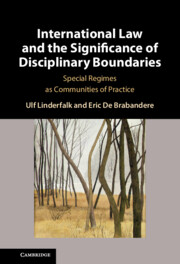Refine search
Actions for selected content:
3 results
2 - Special Regimes as Communities of Practice
-
- Book:
- International Law and the Significance of Disciplinary Boundaries
- Published online:
- 21 November 2024
- Print publication:
- 28 November 2024, pp 23-43
-
- Chapter
- Export citation
1 - The Concept of a Special Regime
-
- Book:
- International Law and the Significance of Disciplinary Boundaries
- Published online:
- 21 November 2024
- Print publication:
- 28 November 2024, pp 1-22
-
- Chapter
-
- You have access
- HTML
- Export citation

International Law and the Significance of Disciplinary Boundaries
- Special Regimes as Communities of Practice
-
- Published online:
- 21 November 2024
- Print publication:
- 28 November 2024
